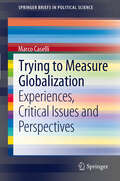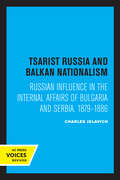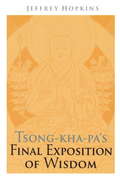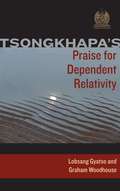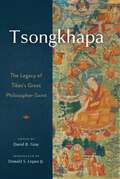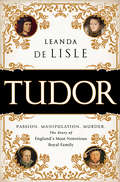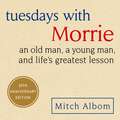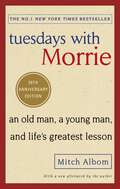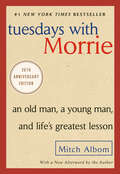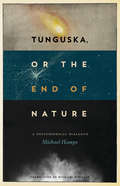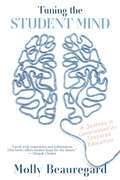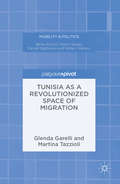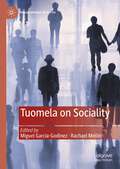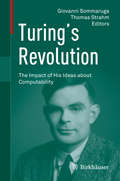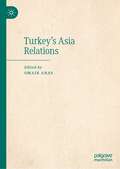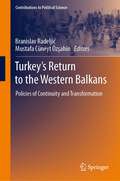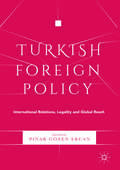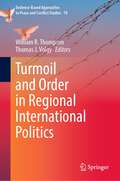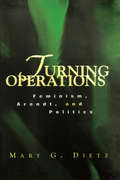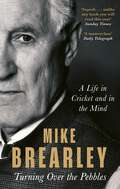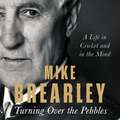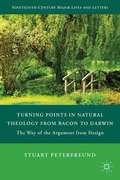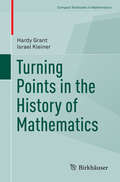- Table View
- List View
Trying to Measure Globalization
by Marco CaselliThe aim of this book is to conduct a critical survey of the main tools devised for the synthetic measurement of globalization processes. To this end, the first part of the book discusses the meaning of the concept considered, highlighting the different and often contradictory interpretations put forward in its regard in the literature. Subsequently analysed are the passages and issues that must be addressed when constructing an instrument intended to measure a social phenomenon of such complexity as globalization. Stressed in particular is that the researcher's subjectivity is repeatedly involved in these passages, so that no instrument can have objective validity. Given these premises, the book presents the principal tools employed in attempts to measure globalization, starting with those whose unit of analysis is the state. In this regard, particular space is devoted to indexes which take a multidimensional approach to the concept of globalization. There follows a comparison among the results obtained using these indexes, and criticisms are made of the ways in which the latter have been constructed. A limitation, or if one wishes a paradox, concerning such tools is that they measure in relation to states a process which has as one of its principal features the fact that it extends beyond the confines of states. For this reason, the final chapter considers whether globalization can be measured with different units of analysis - in particular people and cities. The books concludes with discussion of the general limitations of globalization indexes.
Tsarist Russia and Balkan Nationalism: Russian Influence in the Internal Affairs of Bulgaria and Serbia, 1879-1886
by Charles JelavichThis title is part of UC Press's Voices Revived program, which commemorates University of California Press’s mission to seek out and cultivate the brightest minds and give them voice, reach, and impact. Drawing on a backlist dating to 1893, Voices Revived makes high-quality, peer-reviewed scholarship accessible once again using print-on-demand technology. This title was originally published in 1958.
Tsong-kha-pa's Final Exposition of Wisdom
by Jeffrey HopkinsTsong-kha-pa's Final Exposition of Wisdom brilliantly explicates ignorance and wisdom, explains the relationship between dependent-arising and emptiness, shows how to meditate on emptiness, and explains what it means to view phenomena as like illusions.
Tsongkhapa's Praise for Dependent Relativity
by Lobsang Gyatso Geshe Graham Woodhouse Je TsongkhapaTsongkhapa (1357-1419), the author of The Great Treatise on the Stages of the Path to Enlightenment and the teacher of the First Dalai Lama, is renowned as one of the greatest scholar-saints that Tibet has ever produced. He composed his poetic Praise for Dependent Relativity the very morning that he abandoned confusion and attained the final view, the clear realization of emptiness that is the essence of wisdom. English monk Graham Woodhouse, a longtime student of Buddhism, was living near the Dalai Lama's residence in northern India when he translated Tsongkhapa's celebrated text, and he conveys for modern readers the explanation of it he received from his teacher, the late Venerable Lobsang Gyatso.
Tsongkhapa: The Legacy of Tibet's Great Philosopher-Saint
by David B. GrayTsongkhapa&’s seminal contributions to Buddhist thought and practice, and to the course of history, are illuminated and celebrated by some of his foremost modern interpreters.Few figures have impacted the trajectory of Buddhism as much as the great philosopher and meditator, scholar and reformer, Tsongkhapa Losang Drakpa (1357–1419), the founder of the Geluk school of Tibetan Buddhism and teacher of the First Dalai Lama. His Ganden tradition spread throughout Central Asia and Mongolia, and today, through figures such as the Dalai Lama, who calls Tsongkhapa a second Nagarjuna, his teachings are shaping intellectual conversations and ethical practice globally. To commemorate the 600th anniversary of Tsongkhapa&’s passing, a special conference was held at Ganden Monastery in India in 2019, featuring some of the best translators and interpreters of his teachings today. Highlights of those incisive summations of Tsongkhapa&’s special contributions are gathered in this volume. Here we discover Tsongkhapa the philosopher, Tsongkhapa the master of the Buddhist canon, Tsongkhapa the tantric adept, and Tsongkhapa as the visionary who united wisdom to compassion. Each of the authors featured looks at a distinct facet of Tsongkhapa&’s legacy. Donald Lopez provides a global context, Guy Newland distills Tsongkhapa&’s Middle Way, Dechen Rochard uncovers the identity view, Jay Garfield examines the conceptualized ultimate, Thupten Jinpa highlights the seminal importance Tsongkhapa placed on ascertainment, David Gray looks at his approach to Cakrasamvara tantra, Gavin Kilty surveys his Guhyasamaja tantra commentary, Roger Jackson surmises his views on Zen and mahamudra, Geshé Ngawang Samten examines his provisional-definitive distinction, Gareth Sparham highlights his scholastic prowess, Mishig-Ish Bataa illuminates his impact in Mongolia, and Bhiksuni Thubten Chodron presents his instructions on how to cultivate compassion. Whether you are well acquainted with Tsongkhapa&’s life and thought or you are encountering him here for the first time, you will find The Legacy of Tsongkhapa an illuminating survey of his unique explorations of the highest aspirations of humanity.
Tudor: Passion. Manipulation. Murder. The Story of England's Most Notorious Royal Family
by Leanda De LisleThe Tudors are England’s most notorious royal family. But, as Leanda de Lisle’s gripping new history reveals, they are a family still more extraordinary than the one we thought we knew. The Tudor canon typically starts with the Battle of Bosworth in 1485, before speeding on to Henry VIII and the Reformation. But this leaves out the family’s obscure Welsh origins, the ordinary man known as Owen Tudor who would fall (literally) into a Queen’s lap-and later her bed. It passes by the courage of Margaret Beaufort, the pregnant thirteen-year-old girl who would help found the Tudor dynasty, and the childhood and painful exile of her son, the future Henry VII. It ignores the fact that the Tudors were shaped by their past-those parts they wished to remember and those they wished to forget. By creating a full family portrait set against the background of this past, de Lisle enables us to see the Tudor dynasty in its own terms, and presents new perspectives and revelations on key figures and events. De Lisle discovers a family dominated by remarkable women doing everything possible to secure its future; shows why the princes in the Tower had to vanish; and reexamines the bloodiness of Mary’s reign, Elizabeth’s fraught relationships with her cousins, and the true significance of previously overlooked figures. Throughout the Tudor story, Leanda de Lisle emphasizes the supreme importance of achieving peace and stability in a violent and uncertain world, and of protecting and securing the bloodline. Tudor is bristling with religious and political intrigue but at heart is a thrilling story of one family’s determined and flamboyant ambition.
Tuesdays With Morrie: An old man, a young man, and life's greatest lesson
by Mitch AlbomMaybe it was a grandparent, or a teacher or a colleague. Someone older, patient and wise, who understood you when you were young and searching, and gave you sound advice to help you make your way through it. For Mitch Albom, that person was Morrie Schwartz, his college professor from nearly twenty years ago.Maybe, like Mitch, you lost track of this mentor as you made your way, and the insights faded. Wouldn't you like to see that person again, ask the bigger questions that still haunt you? Mitch Albom had that second chance. He rediscovered Morrie in the last months of the older man's life. Knowing he was dying of ALS - or motor neurone disease - MItch visited Morrie in his study every Tuesday, just as they used to back in college. Their rekindled relationship turned into one final 'class': lessons in how to live.TUESDAYS WITH MORRIE is a magical chronicle of their time together, through which Mitch shares Morrie's lasting gift with the world.
Tuesdays With Morrie: An old man, a young man, and life's greatest lesson
by Mitch AlbomTHE GLOBAL PHENOMENON THAT TOUCHED THE HEARTS OF OVER 9 MILLION READERS'Mitch Albom sees the magical in the ordinary' Cecilia Ahern__________Maybe it was a grandparent, or a teacher or a colleague? Someone older, patient and wise, who understood you when you were young and searching, and gave you sound advice to help you make your way through it? For Mitch Albom, that person was Morrie Schwartz, his college professor from nearly twenty years ago.Maybe, like Mitch, you lost track of this mentor as you made your way, and the insights faded. Wouldn't you like to see that person again, ask the bigger questions that still haunt you?Mitch Albom had that second chance. He rediscovered Morrie in the last months of the older man's life. Knowing he was dying of ALS - or motor neurone disease - Mitch visited Morrie in his study every Tuesday, just as they used to back in college. Their rekindled relationship turned into one final 'class': lessons in how to live.Tuesdays with Morrie is a magical chronicle of their time together, through which Mitch shares Morrie's lasting gift with the world.__________WHAT READERS SAY ABOUT TUESDAYS WITH MORRIE'You cannot put the book down until you reach the end . . . Too good to be missed. It is really an all-time hit''One of the most beautiful books I've read in a long, long time . . . It will always be one of my favourite books''This book moved me immensely and its teachings will stay with me''A simple yet moving account of love and loss - but also hope for something better''A book I will read and re-read'
Tuesdays with Morrie: An Old Man, A Young Man and Life's Greatest Lesson
by Mitch AlbomTHE STORY: TUESDAYS WITH MORRIE is the autobiographical story of Mitch Albom, an accomplished journalist driven solely by his career, and Morrie Schwartz, his former college professor. Sixteen years after graduation, Mitch happens to catch Morrie's appearance on a television news program and learns that his old professor is battling Lou Gehrig's Disease. Mitch is reunited with Morrie, and what starts as a simple visit turns into a weekly pilgrimage and a last class in the meaning of life.
Tumchyamadhil Chanakya: तुमच्यामधील चाणक्य
by Radhakrushnan Pillai“तुमच्यामधील चाणक्य” हा राधाकृष्णन पिळाईंचा लेख चाणक्याच्या विचारधारा आणि तत्त्वज्ञानावर आधारित आहे. चाणक्य, ज्याचे खरे नाव कौटिल्य किंवा विष्णुगुप्त, हे प्राचीन भारतीय इतिहासातील एक महान विचारक आणि राजकीय तत्त्वज्ञ होते. त्यांचा “अर्थशास्त्र” आणि “चाणक्य नीती” या ग्रंथांनी भारतीय राजकारण आणि समाजशास्त्रावर मोठा प्रभाव टाकला आहे. या पुस्तकात, लेखकाने चाणक्याच्या जीवनाचे विविध पैलू तपासले आहेत, आणि त्यांच्या विचारधारेशी संबंधित आधुनिक काळातील संदर्भांवर चर्चा केली आहे. चाणक्याने आपल्या तत्त्वज्ञानाद्वारे विविध सामाजिक आणि राजकीय परिस्थितींवर प्रभाव टाकला आणि त्याच्या विचारांमुळे अनेक राजे आणि शासकांनी आपल्या राज्यव्यवस्थेत सुधारणा केल्या. लेखकाने चाणक्याच्या विचारांचे तत्त्वज्ञान सोप्या आणि सुलभ भाषेत प्रस्तुत केले आहे, ज्यामुळे वाचकांना त्याचे ज्ञान आणि विचार समजून घेणे सोपे जाते. पुस्तकात चाणक्याच्या जीवनातील प्रमुख घटनांवर प्रकाश टाकला आहे, जसे की त्याने मगध साम्राज्याच्या स्थापनेमध्ये कसा महत्वाचा रोल बजावला. चाणक्याच्या शिक्षणाने आणि रणनीतीने त्याच्या काळातील राजकारणात कशी क्रांती घडवली हे स्पष्ट केले आहे. वाचनालयातील संदर्भांनी सुसंगततेसाठी अचूक मार्गदर्शन प्रदान केले आहे. “तुमच्यामधील चाणक्य” हे पुस्तक व्यक्तीगत आणि व्यावसायिक जीवनातील समस्यांचा सामना करण्यासाठी आणि त्यात यशस्वी होण्यासाठी चाणक्याच्या अमूल्य ज्ञानाचा उपयोग करण्याचे मार्गदर्शन करते.
Tunguska, or the End of Nature: A Philosophical Dialogue
by Michael HampeOn June 30, 1908, a mysterious explosion erupted in the skies over a vast woodland area of Siberia. Known as the Tunguska Event, it has been a source of wild conjecture over the past century, attributed to causes ranging from meteors to a small black hole to antimatter. In this imaginative book, Michael Hampe sets four fictional men based on real-life scholars--a physicist (Günter Hasinger and Steven Weinberg), a philosopher (Paul Feyerabend), a biologist (Adolf Portmann), and a mathematician (Alfred North Whitehead)--adrift on the open ocean, in a dense fog, to discuss what they think happened. The result is a playful and highly illuminating exploration of the definition of nature, mankind’s role within it, and what its end might be. Tunguska, Or the End of Nature uses its four-man setup to tackle some of today’s burning issues--such as climate change, environmental destruction, and resource management--from a diverse range of perspectives. With a kind of foreboding, it asks what the world was like, and will be like, without us, whether we are negligible and the universe random, whether nature can truly be explained, whether it is good or evil, or whether nature is simply a thought we think. This is a profoundly unique work, a thrillingly interdisciplinary piece of scholarly literature that probes the mysteries of nature and humans alike.
Tuning the Student Mind: A Journey in Consciousness-Centered Education
by Molly BeauregardHow can we rethink teaching practices to include and engage the whole student? What would student experience look like if we integrated silence and feeling with empirical analysis? Tuning the Student Mind is the story of one teacher's attempt to answer these questions by creating an innovative college course that marries the spiritual and the theoretical, integrating meditation and self-reflection with more conventional academic curriculum. The book follows Molly Beauregard and her students on their intellectual and spiritual journey over the course of a semester in her class, "Consciousness, Creativity, and Identity." Interweaving personal stories, student writing, and Beauregard's responses, along with recommendations for further reading and a research appendix, it makes the case for the transformative power of consciousness-centered education. Written in a warm, engaging voice that reflects Beauregard's teaching style, Tuning the Student Mind provides an accessible, step-by-step template for other educators, while inviting readers more broadly to reconnect with the joy of learning in and beyond the classroom.
Tunisia as a Revolutionized Space of Migration (Mobility & Politics)
by Martina Tazzioli Glenda GarelliThis book explores the transformation of the Tunisian space of mobility after the Arab Uprisings, looking at the country’s emerging profile as a migratory “destination” and focusing on refugees from Syria, Libya, and Sub-Saharan countries; Tunisian migrants in Europe who return home; and young undocumented European migrants living in Tunis. This work engages with and contributes to the broader conversation on the migrations-crisis nexus, by retracing the geographies of mobility which are reshaping the Mediterranean region.
Tuomela on Sociality (Philosophers in Depth)
by Miguel Garcia-Godinez Rachael MellinRaimo Tuomela, late Professor Emeritus at the Centre for Philosophy of Social Sciences (TINT), University of Helsinki, is widely regarded as one of the most important philosophers of our time. He published extensively on various topics within social philosophy; particularly, on social action, cooperation, group belief, group responsibility, group reasoning, social practices, and institutions. To celebrate his legacy, this volume engages with and delves deeply into his philosophy of sociality. By gathering original essays from a world-class line-up of social ontologists, social action theorists, and social philosophers, this collection provides the first comprehensive and critical treatment of Tuomela's outstanding contribution to social ontology and collective intentionality.
Turing’s Revolution: The Impact of His Ideas about Computability
by Giovanni Sommaruga Thomas StrahmThis book provides an overview of the confluence of ideas in Turing’s era and work and examines the impact of his work on mathematical logic and theoretical computer science. It combines contributions by well-known scientists on the history and philosophy of computability theory as well as on generalised Turing computability. By looking at the roots and at the philosophical and technical influence of Turing’s work, it is possible to gather new perspectives and new research topics which might be considered as a continuation of Turing’s working ideas well into the 21st century.The Stored-Program Universal Computer: Did Zuse Anticipate Turing and von Neumann?” is available open access under a Creative Commons Attribution 4.0 International License via link.springer.com
Turkey's Asia Relations
by Omair AnasThis book explores shifts in Turkey's foreign policy and the relevance of Turkey's reconnect offensive with Asia. With the end of the Cold War, Turkey and the West had lost the mutuality of interests and threat perceptions, particularly towards Russia. Western countries are now occupied by the rise of China and are in search of new allies in the Asia Pacific. Turkey is left in its region to deal with Russia and crises that are primary outcomes of Western failures in Syria, Libya, Iraq, Azerbaijan, and Qatar. In the absence of its Western allies, Turkey engaged with Russia alone to deconflict and stabilise Syria, Libya, and Azerbaijan. Turkey's ruling conservative AK Party, however, had won elections from 2002 to 2012 on a strong pro-EU and pro-West agenda. Now, it is talking about ‘strategic autonomy’, ‘multidimensionalism’, ‘diversification’, or ‘the world is bigger than five’. The new foreign policy gestures are underpinned by the rise of the domestic defence industry, nationalist politics at home, and increased trade relations with key Asian economies, China, India, and Indonesia. At an international level, the ruling party has instrumentalised strong criticism of the West for injustice and neglect of the Turkish, Muslim, Islamic, and non-western world. Although this reminds of the history of Turkey's failed quests to shift from a West-centric foreign policy to an unknown direction, the book argues that Turkey's reconnect with Asia is rather to complement and strengthen its relations with the West.
Turkey’s Return to the Western Balkans: Policies of Continuity and Transformation (Contributions to Political Science)
by Branislav Radeljić Mustafa Cüneyt ÖzşahinThis volume sheds new light on the interaction between Turkey and the Western Balkans. Written from a multidisciplinary perspective, the contributions decode the essence of bilateral relations by analyzing various aspects of regional diplomacy, including official initiatives for cooperation and the impact of different interstate exchanges. In addition to the political aspect, the book highlights the economic dimensions of Turkey’s involvement in the Western Balkans, by exploring trade linkages and prospects for future partnership arrangements. Finally, socio-cultural components of bilateral relations are examined, with some contributors focusing on the role of art, religion, and cultural heritage in Turkish foreign policy toward the Western Balkans. While providing detailed analysis and reflections on Turkey’s direction and policy preferences, this unique collection appeals to scholars of international relations, Balkan and Turkish studies, and other neighboring disciplines, as well as to policymakers and general readership interested in the region and international collaboration.
Turkish Foreign Policy: International Relations, Legality and Global Reach
by Pınar Gözen ErcanRich in its spatial scope, this edited collection provides an extensive and detailed overview of contemporary Turkish foreign policy. From the founding principles of foreign policy in the early republic to changing patterns during the second half of the 20th century, this text not only charts underexplored periods in Turkish foreign policy history, but also offers a fresh analysis of recent events, with new challenges ever-emerging in this region. This volume is essential reading for students, scholars and professionals of International Relations, foreign policy and international law who would like to study Turkish foreign policy.
Turmoil and Order in Regional International Politics (Evidence-Based Approaches to Peace and Conflict Studies #10)
by William R. Thompson Thomas J. VolgyThis edited book complements and follows up on the book, Thompson and Volgy et al, Regions, Power and Conflict: Constrained Capabilities, Hierarchy, and Rivalry. It is predicated in part on the paucity of published material available on comparing regional international politics. Monadic, dyadic, and systemic approaches all have their uses and have been exploited extensively. The same cannot be said about comparative regional analysis. The premise is that a great deal of international politics takes place within regional parameters. Most states simply lack the capability or interest in devoting many resources to extra-regional affairs. Yet each region is distinctive. In some, military coups remain common while they have died out as a form of political practice in others. A few have been highly conflictual and then become more pacific, while others persist in their conflict intensity. Some have powerful neighbors with intervention tendencies, while others are surrounded by relatively weak states. Some are rich; others are poor. The point is that regions, all with proper names, have attributes that can be harnessed through comparison to explain why regional behavior differs greatly across the planet. The aim is to replace the proper names with the leading variables that appear to drive behavior. For instance, to shrug and say “that’s the Middle East for you” does not take us very far. Replacing the Middle East label with conceptualization about how a set of small, weak, autocratic states behave subject to high penetration by major powers might take us farther than shrugging off regional identity. We have good reasons to think that comparative regional analysis can deliver an explanatory value-added product just as much as alternative “levels of analysis” can. Ultimately, we might desire to integrate separate levels of analysis, rather than segregating them. But in the short term, we need to encourage comparative regional analysis because it is the least developed perspective. Why that might be the case can be debated, but it stems in part from our disciplinary tendencies for some analysts to specialize in regional behavior largely in a descriptive vein while others prefer to focus on explaining universal behavior. Comparative regional behavior tends to be squeezed out by regional scholars who suspect generalization about behavior and universal scholars who suspect particular contexts such as regions. Comparative regional analysis requires analysts who are willing to explore generalization but acknowledge regional contexts more explicitly than is customary. At the same time, more general substitutes for those regional labels must be introduced if explanatory headway is to be achieved.
Turning Operations: Feminism, Arendt, Politics
by Mary DietzThrough the re-interpretation of influential thinkers such as Arendt, Weil, Beauvoir and Habermas, Mary G. Dietz weds the concerns of demcratic thought with that of feminist political theory, demonstrating how important feminist theory has become to democratic thinking more generally. Bringing together fifteen years of commentary on critical debates, Turning Operations begins with problems central to feminism and ends with a series of reflections on the "the politics of politics," inviting the reader to think more expansively about the expressly public nature of political life.
Turning Over the Pebbles: A Life in Cricket and in the Mind
by Mike Brearley'If you carry on like this, you'll do nothing but play football and cricket all your life.'These were the exasperated words of Mike Brearley's mother, as he once again trod mud into the family home after a long day playing outdoors. They were also an unwitting but half-accurate prediction, for Brearley would become one of the most successful sportsmen of his generation by playing cricket for Cambridge, Middlesex and then becoming one of England's finest captains. But for Brearley, cricket wasn't just a physical activity, it was also an intellectual game, offering the chance to bring closer together body and mind. When his cricketing career came to end - during his playing days he had had a hiatus as a philosophy lecturer - he eschewed sporting commentary for a career as a psychoanalyst.In Turning Over the Pebbles, which he calls a 'memoir of the mind', Brearley reviews his life with its attendant emotions, tensions and moves. It is also a book of his second thoughts and reassessments, allowing him to understand more fully things that were obscure to him earlier. After all, he says, 'captaining ourselves, like captaining a team, requires a willingness to allow thoughts and feelings their space'.Deeply thoughtful, erudite and elegantly framed, this book seamlessly blends all aspects of Brearley's life into a single integrated narrative. With wide-ranging meditations on sport, philosophy, literature, religion, leadership, psychoanalysis, music and more, Brearley delves into his private passions and candidly examines the various shifts, conflicts and triumphs of his extraordinary life and career, both on and off the field.
Turning Over the Pebbles: A Life in Cricket and in the Mind
by Mike Brearley'If you carry on like this, you'll do nothing but play football and cricket all your life.'These were the exasperated words of Mike Brearley's mother, as he once again trod mud into the family home after a long day playing outdoors. They were also an unwitting but half-accurate prediction, for Brearley would become one of the most successful sportsmen of his generation by playing cricket for Cambridge, Middlesex and then becoming one of England's finest captains. But for Brearley, cricket wasn't just a physical activity, it was also an intellectual game, offering the chance to bring closer together body and mind. When his cricketing career came to end - during his playing days he had had a hiatus as a philosophy lecturer - he eschewed sporting commentary for a career as a psychoanalyst.In Turning Over the Pebbles, which he calls a 'memoir of the mind', Brearley reviews his life with its attendant emotions, tensions and moves. It is also a book of his second thoughts and reassessments, allowing him to understand more fully things that were obscure to him earlier. After all, he says, 'captaining ourselves, like captaining a team, requires a willingness to allow thoughts and feelings their space'.Deeply thoughtful, erudite and elegantly framed, this book seamlessly blends all aspects of Brearley's life into a single integrated narrative. With wide-ranging meditations on sport, philosophy, literature, religion, leadership, psychoanalysis, music and more, Brearley delves into his private passions and candidly examines the various shifts, conflicts and triumphs of his extraordinary life and career, both on and off the field.
Turning Over the Pebbles: A Life in Cricket and in the Mind
by Mike Brearley'If you carry on like this, you'll do nothing but play football and cricket all your life.'These were the exasperated words of Mike Brearley's mother, as he once again trod mud into the family home after a long day playing outdoors. They were also an unwitting but half-accurate prediction, for Brearley would become one of the most successful sportsmen of his generation by playing cricket for Cambridge, Middlesex and then becoming one of England's finest captains. But for Brearley, cricket wasn't just a physical activity, it was also an intellectual game, offering the chance to bring closer together body and mind. When his cricketing career came to end - during his playing days he had had a hiatus as a philosophy lecturer - he eschewed sporting commentary for a career as a psychoanalyst.In Turning Over the Pebbles, which he calls a 'memoir of the mind', Brearley reviews his life with its attendant emotions, tensions and moves. It is also a book of his second thoughts and reassessments, allowing him to understand more fully things that were obscure to him earlier. After all, he says, 'captaining ourselves, like captaining a team, requires a willingness to allow thoughts and feelings their space'.Deeply thoughtful, erudite and elegantly framed, this book seamlessly blends all aspects of Brearley's life into a single integrated narrative. With wide-ranging meditations on sport, philosophy, literature, religion, leadership, psychoanalysis, music and more, Brearley delves into his private passions and candidly examines the various shifts, conflicts and triumphs of his extraordinary life and career, both on and off the field.
Turning Points in Natural Theology from Bacon to Darwin
by Stuart PeterfreundDiscusses crucial moments in the historical development of natural theology in England from the time of Francis Bacon to that of Charles Darwin. While the argument from design remains the rhetorical method of choice for natural theologians throughout the three centuries in question, the locus and object of design undergo a change.
Turning Points in the History of Mathematics
by Hardy Grant Israel KleinerThis book explores some of the major turning points in the history of mathematics, ranging from ancient Greece to the present, demonstrating the drama that has often been a part of its evolution. Studying these breakthroughs, transitions, and revolutions, their stumbling-blocks and their triumphs, can help illuminate the importance of the history of mathematics for its teaching, learning, and appreciation. Some of the turning points considered are the rise of the axiomatic method (most famously in Euclid), and the subsequent major changes in it (for example, by David Hilbert); the "wedding," via analytic geometry, of algebra and geometry; the "taming" of the infinitely small and the infinitely lar≥ the passages from algebra to algebras, from geometry to geometries, and from arithmetic to arithmetics; and the revolutions in the late nineteenth and early twentieth centuries that resulted from Georg Cantor's creation of transfinite set theory. The origin of each turning point is discussed, along with the mathematicians involved and some of the mathematics that resulted. Problems and projects are included in each chapter to extend and increase understanding of the material. Substantial reference lists are also provided. Turning Points in the History of Mathematics will be a valuable resource for teachers of, and students in, courses in mathematics or its history. The book should also be of interest to anyone with a background in mathematics who wishes to learn more about the important moments in its development.
